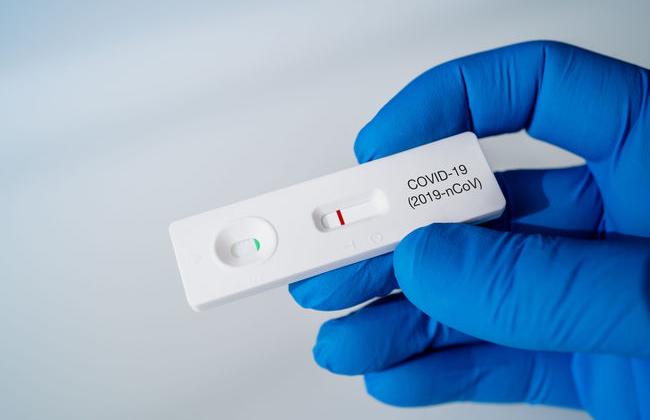Rapid Antigen Tests for SARS-CoV-2: Comparative Sensitivity Evaluation of CE-Marked Tests
Experts from the Paul-Ehrlich-Institut in alliance with researchers from other institutions have evaluated the sensitivity of a total of 122 COVID-19 rapid antigen tests and examined the tests’ ability to detect the SARS-CoV-2 virus. The findings show that the sensitivity of the tests varied widely. Overall, 96 rapid antigen tests met the required criteria, in some cases with very good results, while 26 tests did not provide the required sensitivity. The findings are reported by ‘Eurosurveillance’ in its online edition dated 4 November 2021.

There is currently a large number of CE-marked SARS-CoV-2 rapid antigen tests available on the European market – both for professional use and for self-testing by private individuals. These rapid antigen tests are based on so-called lateral flow immunochromatography lined with specific antibodies to detect SARS-CoV-2 antigen in samples from the respiratory tract and thus offer a reliable diagnosis of acute SARS-CoV-2 infection.
A positive rapid antigen test still needs to be confirmed by a polymerase chain reaction (PCR) test – the gold standard of SARS-CoV-2 diagnostics. In the early phase of infection, infectivity through respiratory secretions correlate with a high viral load (virus quantities), i.e., up to five to seven days after symptom onset. It is precisely these high quantities of the virus that enable rapid antigen testing to detect SARS-CoV-2 in this acute phase of infection. Therefore, if they are of an appropriate quality, rapid antigen tests permit prompt identification of acutely infected and potentially infectious persons and make it possible to take immediate measures to prevent the spread of the virus. In addition, the rapid antigen tests spare using the limited reagents of more sensitive molecular diagnostics which can then meet other diagnostic needs, such as disease management or confirmation of positive rapid antigen tests.
That said, the tests can only contribute reliably to containing the pandemic if they meet the minimum criteria for detection of SARS-CoV-2. However, under the current EU In Vitro Diagnostics (IVD) Directive, which currently governs marketing authorisation for IVDs in Europe, manufacturers can still self-certify COVID-19 tests as "low-risk IVDs" and waive independent verification of the tests before marketing them. This will change from May 2022: As of that point in time, as per the IVD Regulation an EU reference laboratory and a Notified Body will have to be consulted for their certification, as the COVID-19 tests will come under the highest risk category. In future, this will require laboratory testing of the tests as well as independent verification of the data. The Paul-Ehrlich-Institut is already preparing to apply to act as one of the EU reference laboratories responsible. Until then, the Paul-Ehrlich-Institut is conducting a comparative study of these tests in order to try and fill the current shortfall in the evaluation of these critical tests.
A total of 122 CE-marked SARS-CoV-2 rapid antigen tests and antigen self-tests available in Germany have to date been tested by staff at the Paul–Ehrlich-Institut working under Dr Heinrich Scheiblauer of the IVD Testing Laboratory and PD Dr Micha Nübling, Head of the Major Policy Issues and Coordination division, as well as by researchers at the Robert Koch Institute, the Charité Universitätsmedizin Berlin, Institut für Mikrobiologie der Bundeswehr, LADR GmbH, Geesthacht, the Bernhard Nocht Institute for Tropical Medicineand MVZ Labor 28 in Berlin. This ensures that only the rapid antigen tests that meet the minimum criteria will be in use. One important prerequisite for the reliability of a test is it possessing sufficient sensitivity of the rapid antigen test. Sensitivity expresses how well the test is able to detect the virus.
The sensitivity of these rapid antigen tests was evaluated with the help of a joint evaluation panel set up by the Robert-Koch Institut. The minimum accepted sensitivity was established as 75 % based on a RT-PCR Ct value of < 25. The Ct (cycle threshold) value measures the amount of the virus in the sample: The value indicates how many replication cycles have to occur with the PCR method before the increase in the viral genetic material becomes exponential. The lower this figure, the fewer multiplication cycles were necessary and thus the higher the concentration of the virus in the sample.
The study found that the sensitivity of the various SARS-CoV-2 rapid antigen tests varies widely. The required sensitivity threshold of 75 % for Ct < 25 was achieved by 96 of the 122 tests evaluated; in other words, 26 tests exhibited a lower sensitivity. By contrast, there were also some tests that possessed a very high sensitivity.
The comparative evaluation makes it possible to distinguish less sensitive from better-performing antigen rapid tests. Most of the rapid antigen tests assessed met the necessary conditions and are suitable for the rapid identification of acute infections with high viral loads.
A list on the website of the Federal Institute for Drugs and Medical Devices (BfArM) offers an overview of all antigen tests that meet the minimum criteria according to the information provided by the respective manufacturer and which qualify for reimbursement under the Coronavirus Test Decree (Coronavirus-Testverordnung, TestV). Tests that passed our evaluation are stated list given in the Paul-Ehrlich-Institut’s “Comparative evaluation of the sensitivity of SARS-CoV-2 rapid antigen tests”. If a test does not meet the criteria used in this assessment, it will be deleted from the BfArM list.
Original Publication
Scheiblauer H, Filomena A, Nitsche A, Puyskens A, Corman VM, Drosten C, Zwirglmaier K, Lange C, Emmerich P, Müller M, Knauer O, Nübling CM (2021): Comparative sensitivity evaluation for 122 CE-marked rapid diagnostic tests for SARS-CoV-2 antigen, Germany, September 2020 to April 2021.
Euro Surveill 26: 2100441.
Text
top



